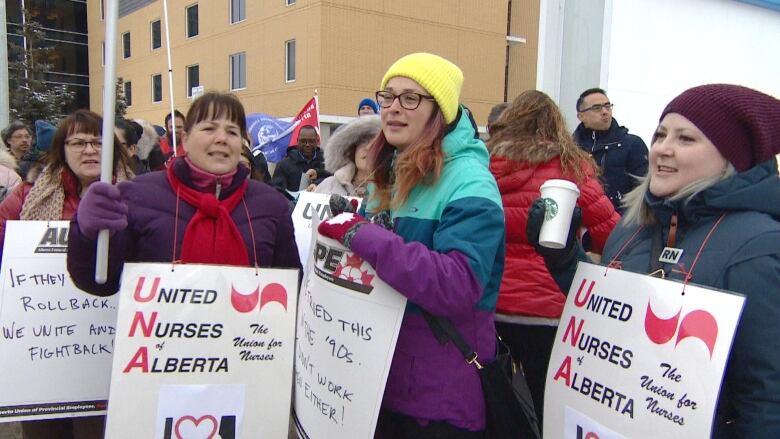Turbulent times ahead in Alberta labour negotiations, expert predicts
Contract negotiations delayed by pandemic may lead to strike action, professor says

An expert in labour relations is predicting a turbulent year ahead for Alberta as contract negotiations loom for many public sector employees.
Many collective agreements to be hashed out earlier this year were delayed due to the COVID-19 pandemic.
"But at some point, the unions and the government are going to get to the table," Bob Barnetson, a professor of labour relations at Athabasca University, said in an interview with CBC Radio's Edmonton AM.
"I think we are headed for particularly difficult rounds of bargaining that will likely result in strikes."
Barnetson predicts the most friction in bargaining units in the core public sector within the government of Alberta and in the healthcare system, including nurses, nursing aids, and support staff.
A list on the governmentof Alberta's website of current and upcoming collective bargaining shows a slew of expired agreements between the province or affiliated services and unions like the Alberta Union of ProvincialEmployees, the Health Sciences Association of Alberta, and the United Nurses of Alberta.
- Job negotiations between AUPE and province paused amid pandemic
- AUPE files constitutional challenge of Alberta's Critical Infrastructure Defence Act
If a strike were to happen, Barnetson said Albertans could see essential services disrupted.
"I use that word 'essential' fairly carefully," he added. "Because the government tends to use it in a way that means you have to go to work no matter what."
Barnetson said the pattern would likely begin the same way it did during the Ralph Klein era in the 1990s with wildcat strikes, essentially an illegal form of strike by a union local.
"That happens usually pretty spontaneously," he said. "And then the union whose local has gone out is going to have to make a decision: Are we going to back this local or are we going to try to rein them in?"
In the past, unions reined in their locals something Barnetson says "turned out to not be a very good decision."
Onestriking union could then create a domino effect as other unions make the decision whether they too will walk out.
"So I would think that's the most likely scenario, but who knows what might happen in four or six or eight months from now?"
$24.2-billion deficit
The Alberta Union of Provincial Employees (AUPE) and the Alberta government paused their negotiations in April, extending job security for many workers amid promised cuts to the public sector.
A letter sent from the province to the AUPE last November outlined the potential impact of contract negotiations, including possible cuts in various departments including housing, finance, transportation, social services, housing and health.
The letter, addressed to AUPE president Guy Smith, said once the job security protection agreement expired, the government would use "all options available" under the collective agreement to support the government's plan to balance the budget by 2022-23.
In its 2020 budget, the provincial government forecast a deficit of $6.8 billion for the current fiscal year.
But in a fiscal update in late August, Finance Minister Travis Toewsput the projected deficit at almost quadruple that a historic $24.2 billion.
"We need to deliver the most cost-effective government services possible," Toews said."Alberta can no longer afford to be an outlier in terms of the cost of delivering services to Albertans."
The finance minister deflected questions about where the government might cut, advising reporters to "stay tuned" for a three-year fiscal update coming in November, and the 2021 budget in February.
- Alberta on track to historic $24.2B deficit thanks to pandemic, oil price slump
- As oil money dries up, Alberta's financial woes laid bare
Barnetson said he doesn'texpect workers or unions to be sympathetic to budget concerns after years of wage freezes and corporate tax cuts the government has touted as economic movers and job makers.
"Public sector deficits and debts are about choices that governments have made," he said.
"So I think workers would ask why they have to shoulder the cost of those government decisions."












_(720p).jpg)


 OFFICIAL HD MUSIC VIDEO.jpg)
.jpg)



























































































